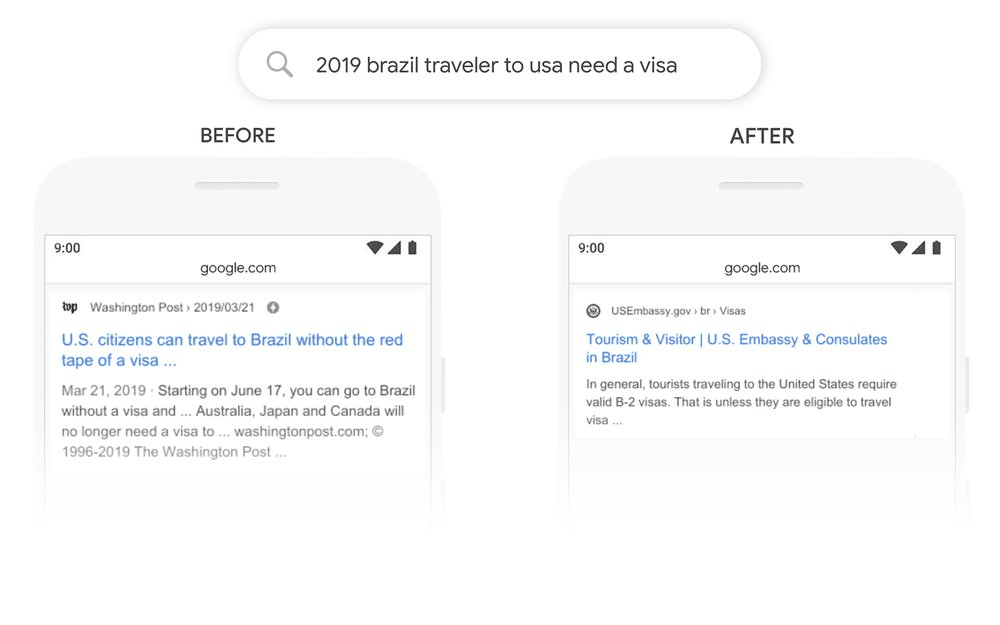
For most companies, it takes a long time to earn a coveted spot in one of the top search results on Google. So it’s nerve-wracking for everyone when the company makes a major update like they did toward the end of 2019.
In October, Google announced it would begin using an artificial intelligence system called BERT. Google updates its algorithm hundreds of times each year, but BERT was the most significant change the company had made in over five years.
BERT provides more relevant search results and is a notable shift away from keyword-specific searches. This article will review what the BERT update is, and what it could mean for your business and SEO strategy going forward.
What does BERT stand for?
BERT stands for Bidirectional Encoder Representations from Transformers. The algorithm is designed to understand the intent behind a user’s search, not just the keywords used.
Thanks to the BERT update, Google now focuses more on search intent rather than just the keyword itself. It helps Google understand the context behind a search, so that it can deliver more accurate results.
In an October blog post, Google Vice President Pandu Nayak used the following analogy to explain how the algorithm works…
Let’s say someone searches for the phrase, “do estheticians stand a lot at work.” Previously, Google would have pulled up search results based on the keywords used in that phrase, like “stand.” But the term “stand” is actually referring to the physical demands of working as an esthetician.
Keyword Intent Matching
Thanks to BERT, Google can better understand the context of the phrase and deliver more targeted search results. The update also allows Google to find results for more complex search queries. This idea of using context to figure out the intent of a search is called “keyword intent matching”, which is different from what was happening before, known as “keyword matching”. Google uses artificial intelligence to determine whether or not a user is satisfied with the results of their search, essentially measuring the relevance of the results in relation to the context and intent of the search.
Below is a screenshot that does a great job of showing the difference in how Google understands the words within a search.

Source: Digital Marketing Institute
What does the BERT update mean for your business?
Google says the update impacts 10% of all search queries, and it will also impact organic rankings and featured snippets. So there’s a good chance your website traffic could take a hit, assuming it hasn’t already.
But more importantly, it’s going to change the way users search Google. Instead of using unnatural keywords to search for information online, most people will begin using more conversational search queries.
Optimize for the user, not for Google.
The biggest takeaway from the BERT algorithm change is that business owners and marketers need to change the way they think about SEO. Instead of trying to optimize your content for SEO, focus on optimizing for your reader. In doing that, you’ll in turn be giving Google what it wants and getting better results in Search.
The BERT algorithm favors websites that readers find valuable. Focusing on creating quality content that provides a specific value to your audience will go a long way toward improving your Google search ranking.
Get SEO help from Sanctuary!
If you’re getting poor organic search results or feel that your website content needs updating to appeal more to your ideal customers, reach out to the Sanctuary team today! Our extensive SEO experience and knowledge of Google’s latest updates will help transform your current content and hopefully get you better results as part of a complete digital marketing plan.
Sources: Digital Marketing Institute
Most Popular Articles

Seeing Favicons in Your Google Search Results? Here’s Why…
Have you noticed anything different in your Google Search results lately? Google added tiny favicon icons to its organic search results in January. It was…

Business Growth and Digital Marketing News & Tips 4-14-24
Did you know? It’s five to twenty-five times more expensive to acquire a new customer than to retain an existing one. Increasing customer retention by…

Business Growth and Digital Marketing News & Tips 3-28-24
With the desire for precise measurement tools to determine ROI, there has been a rise in attention metrics. These metrics, which often utilize eye-tracking data,…








